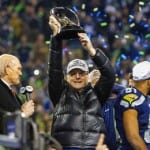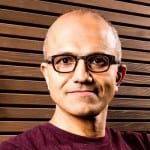 The Seattle Seahawks showed 111.5 million viewers of Super Bowl XLVIII a brand of football that seemed almost completely unfamiliar to their vaunted opponents, the Denver Broncos. The spellbinding intensity, bursts of speed, and hard-hitting offensive and, mostly, defensive impact in practically every phase of the game, made it appear as if the men in blue and green were the big dogs on a playing field being shared with “puppy bowlers.”
The Seattle Seahawks showed 111.5 million viewers of Super Bowl XLVIII a brand of football that seemed almost completely unfamiliar to their vaunted opponents, the Denver Broncos. The spellbinding intensity, bursts of speed, and hard-hitting offensive and, mostly, defensive impact in practically every phase of the game, made it appear as if the men in blue and green were the big dogs on a playing field being shared with “puppy bowlers.”
The audience was the largest ever for a televised event and a global showcase for the team that owner Paul Allen, Seahawk’s general manager John Schneider, and coach Pete Carroll have brilliantly assembled. The Hawks completely disassembled their opponents in Sunday’s 43-8 routing This city’s celebratory parade begins at 2PM, Wednesday at the Space Needle.
Ironically, just as the co-founder of Microsoft was cementing the cornerstone of a new era in Seahawk’s football, a changing of the guard at the very same company that made him fabulously wealthy was underway to a far less aggressive leader in the role of new CEO.
From the moment he took the stage at the 2007 Search Marketing Exposition Advanced Workshop in Seattle, for a public interview on the future of Microsoft’s search platform, Satya Nadella made it clear he was a high-tech professional executive of unusual modesty.
Yet, while the shift in personality and technical perspective comes late in the game for Microsoft, it is not a moment too soon. Redmond’s move from a sales and marketing “quarterback” in the personage of Steve Ballmer (the Richard Sherman of Team Microsoft) to a more cerebral technical strategist, parallels the changes that other tech teams have made in the top executive spot, rivaling a Silicon Valley trend that includes the succession of Steve Jobs to Tim Cook at Apple.
It is as if Microsoft’s planners were taking a page from the playbook of rivals like Google, and even Yahoo, which, in the personas of Larry Page, or even Marissa Mayer, have placed the reins of power in the hands of technology managers as contrasted with business or marketing all-stars. The challenge is especially pivotal for Microsoft which has committed to a unifying strategic outlook among its products and services as the world turns to tablets, mobile devices and wearables in the post-PC era.
 Clearly, Nadella’s skill set is closely aligned with Microsoft’s mission. The Indian-born, engineering and MBA-degreed executive is no stranger to change. When has was recruited to lead Microsoft’s Internet search engineering team, he had not previously worked directly on cloud services of any major scale.
Clearly, Nadella’s skill set is closely aligned with Microsoft’s mission. The Indian-born, engineering and MBA-degreed executive is no stranger to change. When has was recruited to lead Microsoft’s Internet search engineering team, he had not previously worked directly on cloud services of any major scale.
As reported by Geekwire, and captured on video during an interview at LeWeb last year, Gigaom’s Om Malik quizzed Nadella on how he sees “traditional” software vendors such as Microsoft surviving in the new world of connected devices, cloud services and pervasive computing over the next 10 years.
“There is no such thing as ‘traditional,’ ” Nadella responded. “This business of ours doesn’t respect tradition. What it respects is whether you’re relevant and innovating in the future.” [24×7]




















